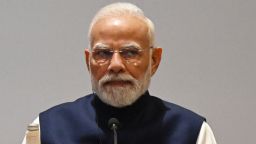India has formally disagreed with claims made by US President Donald Trump regarding the country’s oil imports from Russia. On October 4, 2023, Trump announced that Indian Prime Minister Narendra Modi had assured him India would cease buying Russian oil, which is subject to US sanctions. However, India’s foreign ministry spokesperson, Randhir Jaiswal, swiftly refuted this assertion, stating he was “not aware of any conversation” between Trump and Modi, or any commitment from the Indian leader to halt oil purchases from Russia.
In a statement, India’s foreign ministry emphasized its status as a “significant importer of oil and gas,” without directly referencing Trump’s statement or Modi’s alleged assurance. The ministry underscored its dual objectives of ensuring stable energy prices and securing energy supplies, which includes diversifying its energy sources according to market conditions.
India maintains longstanding economic relations with Russia and is set to host Vladimir Putin later this year. Since Russia’s invasion of Ukraine in February 2022, India has emerged as one of the largest purchasers of Russian oil, capitalizing on discounted prices resulting from extensive sanctions imposed on Russia by Western nations.
India has consistently resisted pressure from the United States to reduce its Russian oil imports. The nation argues that it must prioritize the energy needs of its growing economy, which has a population exceeding 1.4 billion. In August 2023, Trump announced additional tariffs on India, imposing a 25% penalty on oil and gas imports from Russia, further complicating relations.
Analysts highlight the challenges India faces in abruptly ceasing its Russian oil purchases. According to Muyu Xu, a senior oil analyst at the trade intelligence firm Kpler, Russia supplies approximately 1.7 to 1.8 million barrels of oil per day to India. Xu remarked that halting these imports overnight would be nearly impossible due to the sheer volume and the complexities of substituting different crude oil types.
Data from Kpler reveals fluctuating patterns in Indian oil imports. For instance, the state-owned Indian Oil Corporation Limited acquired 10.35 million barrels of Russian oil in January 2023, but this number dropped to 4.62 million barrels in September. As of October 2023, the company had imported 7.03 million barrels from Russia.
CNN has reached out to Indian Oil Corporation Limited regarding its plans for future Russian oil purchases and the factors influencing its sourcing strategy. Modi’s position reflects a broader political narrative, projecting an image of a strong leader focused on India’s interests without yielding to external pressures.
Efforts to mend US-India relations continue, with recent diplomatic engagements aimed at addressing trade issues. Indian Foreign Minister S. Jaishankar acknowledged that unresolved trade negotiations contribute to the current tensions between the two nations. He stated that India is committed to finding a resolution, emphasizing the need for ongoing discussions to navigate these complexities.
As the geopolitical landscape evolves, the dynamics of energy sourcing and international relations remain critical for both India and the United States. The ongoing dialogue will likely shape future engagements, as both nations seek to balance their respective interests on the global stage.
